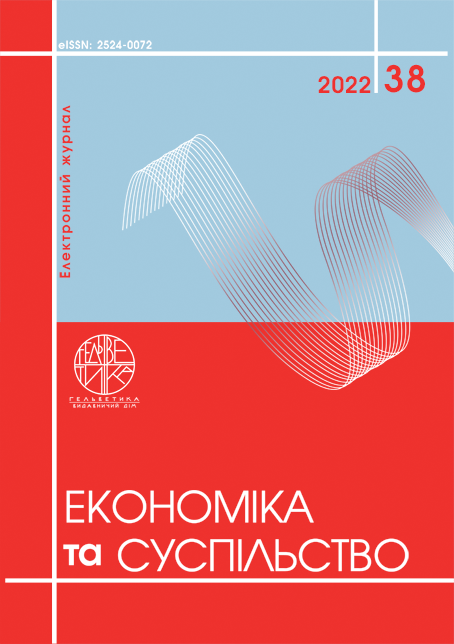ECONOMIC MECHANISM OF NATURAL RESOURCE MANAGEMENT IN MODERN CHALLENGES: PRINCIPLES AND INSTITUTIONALIZATION
Abstract
It was established that a characteristic feature of the economic mechanism of natural resource management in previous years was its noncoverage of a set of norms, methods and tools that would attract financial flows into the environmental sector and ensure the implementation of best foreign environmental practices. The author presents her original concept of developing a set of principles and promising areas of formal and informal institutionalization of the economic mechanism of natural resource management in the transformation of global environmental architecture and intensifying decentralization processes. The use of axiomatic and abstract-logical methods, as well as the institutional approach, contributed to forming a set of principles shaping the economic mechanism of natural resource management: consistency, proportionality, conformity to plan, inexhaustible nature, decentralization, convergence, synergy, institutional coherence, and global benefits. The author justifies that the above set of principles, which are the core of theoretical and methodological support for the formation of the economic mechanism of natural resource management in modern conditions, should be the basis for formal and informal institutionalization of additional methods, tools and levers of regulatory influence on natural resource users. It was established that formal institutionalization is a set of measures aimed at approving new laws on environmental protection and natural resources, as well as relevant regulations, instructions and orders of central, regional and local authorities. The research determined that informal institutionalization involves changing the worldview of employees of natural economic structures and is focused on developing a range of principles, stereotypes and rules of economic use of natural resource potential and non-raw components of the environment. The author found out that given the intensification of embedding the national model of environmental regulation in the global environmental architecture, considering the principle of convergence which provides for the gradual contingence of global, European and Ukrainian regulatory environmental structures becomes significant in shaping a modern economic mechanism of natural recourse use.
References
Бардась В. Удосконалення фіскального регулювання природокористування крізь призму досягнення фіскального оптимуму Лаффера. Економіст. 2013. № 10. С. 42–45.
Голян В.А. Інституціональне середовище водокористування: сучасний стан та механізми вдосконалення : монографія. Луцьк: Твердиня, 2009. 592 c.
Дребот О.І., Гадзало А.Я. Елементи економічного механізму раціонального природокористування та охорони навколишнього природного середовища. Економіка природокористування і охорони довкілля. 2016. С. 186–191.
Коняхіна Т.В. Формування економічного механізму вирішення проблем природокористування. Проблеми економіки. 2013. № 2. C. 306–311.
Савчук В.В. Організаційно-економічні засади впровадження механізму раціоналізації аграрного природокористування в зоні осушення. Агросвіт. 2018. № 8. С. 48–56.
Сакаль О.В. Інструменти фінансово-економічного регулювання природокористування в умовах поглиблення інституціональних трансформацій. Економіка і суспільство. 2017. Випуск 13. С. 930–937.
Мединська Н.В. Трансформація екологічного оподаткування в контексті інвестиційного забезпечення модернізації природоохоронної інфраструктури. Інвестиції: практика та досвід. 2022. № 4. С. 48–53. DOI: https://doi.org/10.32702/2306-6814.2022.4.48
Bardas V. (2013) Udoskonalennia fiskalnoho rehuliuvannia pryrodokorystuvannia kriz pryzmu dosiahnennia fiskalnoho optymumu Laffera [Improving the fiscal regulation of nature through the prism of achieving the fiscal optimum Laffer]. Ekonomist, 10, 42–45.
Holian V.A. (2009) Instytutsionalne seredovyshche vodokorystuvannia: suchasnyi stan ta mekhanizmy vdoskonalennia : monohrafiia [Institutional environment of water use: current state and mechanisms of improvement: monograph]. Lutsk: Tverdynia.
Drebot O.I., Hadzalo A.Ia. (2016) Elementy ekonomichnoho mekhanizmu ratsionalnoho pryrodokorystuvannia ta okhorony navkolyshnoho pryrodnoho seredovyshcha [Elements of the economic mechanism of rational nature use and environmental protection]. Ekonomika pryrodokorystuvannia i okhorony dovkillia, 186–191.
Koniakhina T.V. (2013) Formuvannia ekonomichnoho mekhanizmu vyrishennia problem pryrodokorystuvannia [Formation of an economic mechanism for solving problems of nature management]. Problemy ekonomiky, 2, 306–311.
Savchuk V.V. (2018) Orhanizatsiino-ekonomichni zasady vprovadzhennia mekhanizmu ratsionalizatsii ahrarnoho pryrodokorystuvannia v zoni osushennia [Organizational and economic principles of implementation of the mechanism of rationalization of agrarian nature management in the drainage zone]. Ahrosvit, 8, 48–56.
Sakal O.V. (2017) Instrumenty finansovo-ekonomichnoho rehuliuvannia pryrodokorystuvannia v umovakh pohlyblennia instytutsionalnykh transformatsii [Tools of financial and economic regulation of nature management in the conditions of deepening institutional transformations]. Ekonomika i suspilstvo, 13, 930–937.
Medynska N.V. (2022) Transformatsiia ekolohichnoho opodatkuvannia v konteksti investytsiinoho zabezpechennia modernizatsii pryrodookhoronnoi infrastruktury [Transformation of environmental taxation in the context of investment support for the modernization of environmental infrastructure]. Investytsii: praktyka ta dosvid, 4, 48–53. DOI: https://doi.org/10.32702/2306-6814.2022.4.48


